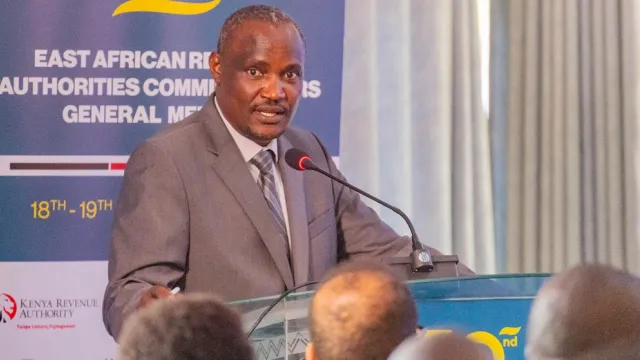Mbadi pushes EAC revenue chiefs to target the hard-to-tax informal sector

Treasury Cabinet Secretary John Mbadi at the 52nd East African Revenue Authorities Commissioners General Meeting: EAC economies are driven by the informal sector so we need to come up with solutions on how to broaden the tax base, especially in this hard-to-tax sector.
Treasury Cabinet Secretary John Mbadi has challenged tax chiefs from across the East African Community (EAC) to devise innovative strategies to collect revenues from hard-to-tax segments of the economy such as the informal sector.
While speaking during the 52nd East African Revenue Authorities Commissioners General Meeting (EARACGs) in Nairobi, Mbadi said this goal would be realized by deploying systems that "enhance tax visibility" across the regional markets.
“A lot of our economies are driven by the informal sector. We need to come up with solutions on how to broaden the tax base, especially in this hard-to-tax sectors of the economy,” CS Mbadi explained.
“What we need to do is to come up with policies that broaden the tax base and ensure that all the people who need to pay tax pay tax have systems that can help us to actualize the same," Mbadi told top tax administrators drawn from Burundi, Rwanda, South Sudan, Tanzania, Uganda, Zanzibar, Kenya, the Democratic Republic of Congo, and Somalia, alongside representatives from the EAC Secretariat.
Noting that EAC economies grew by 5.8 percent in real terms and 14.5 percent in nominal terms in the FY2023/2024 while tax revenue growth lagged at 13.3 percent, the CS urged revenue authorities to intensify efforts in tax harmonization to improve collections.
"This disparity underscores the need to reassess our tax policies and administration strategies to broaden the tax base and boost revenue collection," Mbadi added.
The Nairobi meeting attracted tax chiefs from across the East African Community (EAC) who joined hands to forge a joint path on compliance at a time when the digital economy is giving rise to fresh means to enhance collections and surveillance of industries.
The revenue administrations agreed to continue implementing digital service tax while pushing for the rationalization of tax exemptions to ensure uniform benchmarks across the bloc. They also endorsed a plan to speed up the ratification of the existing Double Taxation Agreements to streamline cross-border partnerships in revenue administration.
Read also: KEBS unmasks two firms defrauding consumers
Power of Artificial Intelligence
At the same time, the officials resolved to tap into digital technologies, including the power of Artificial Intelligence (AI) to optimise the use of the vast data within their repositories to enhance tax compliance and increase collections. The policy makers agreed that AI has the transformative potential but countries must deploy supportive legislations and infrastructure to enhance decision-making.
To tackle goods smuggling and the trade in counterfeits, the tax chiefs urged member countries to adopt measures such as uniform valuation, enforcement strategies, and sharing of information on exports across the bloc.
“There people who do business in our jurisdictions, make profits, but the tax that they pay to us is minimal. We must correct and make sure that every person who benefits from our infrastructure , who is supported by our economies should pay a fare share of taxes just like the domestic companies pay," noted Mbadi.
The bi-annual convening provided an opportunity for the tax administrations to share experiences, enhance collaborations and address common challenges facing Revenue Administration in the region under the theme “Enhancing tax compliance through effective community engagement in a digital era.’’
Other key resolutions made at the forum included the need for harmonisation of taxation in the region especially for domestic tax regimes. In this regard, Commissioners appreciated the progress achieved in the harmonisation of the tax procedures and directed continued engagement with the East African Community Secretariat in furthering tax harmonisation.



